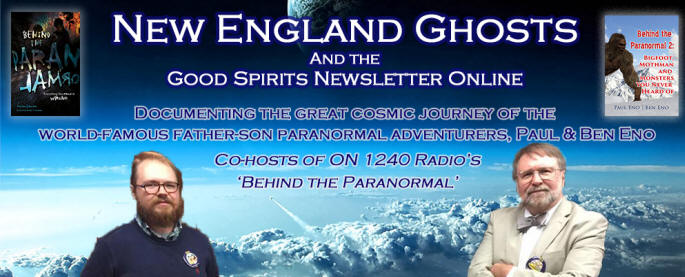Religion and the Paranormal
With interest in the paranormal soaring these days, and with Hollywood at the helm with shows like "Medium" and "Ghost Whisperer," people often ask me what the relationship is between religious belief and belief in the paranormal.
I think what they're really asking is, "Can I be
a good member of a church or synagogue and still believe in the
paranormal?"
It's a very good question.
Interest in the paranormal soars in wartime and whenever the economy sours. Add to that the mistrust many people now have for the mainline churches and the clergy because of recently revealed sex scandals, etc., and people become desperate for something to turn to. We are, after all, homo adorans ("worshipping man"): Worshipping God is part of the way we are built. Hollywood excels in picking up on this need and capitalizing on it, therefore fueling even more interest among viewers.
Popular science can get into the act, too. Far
from debunking the supernatural and religion, some modern scientific
theories, especially quantum mechanics and string theory, are trashing
scientific materialism (the belief that matter is basically all there
is) and indirectly encouraging a new (rather stunning, I think)
interpretation of the paranormal, which my own books on the subject
espouse. While their theology may not jive with that of the local
clergy, some scientists today are routinely talking about God.
In the end, people believe what they want to believe, even within highly
dogmatic religious groups. They will interpret even the strictest
official teachings in their own ways and learn to be comfortable with
them. They will rationalize nearly any belief or practice with the
religion in which they were brought up or in which they feel most at
home. That's why there are pro-choice advocates among Roman Catholics
and Tarot card readers among evangelicals, to name just a few.
Most any student of folklore will tell you that all our religions had their origins in (for all intents and purposes) the paranormal. They resulted from the primal and universal human need to explain the unexplained, especially death. The ultimate drive was and is a gut need to know that our loved ones are okay, and that we will be okay -- that, when all is said and done, Someone loves us. When this need is answered to our satisfaction -- by religion, the paranormal or both -- we have the sense of security, belonging and well-being we all thirst for.
I think interest in the paranormal coexists very comfortably with religious belief, and this draws strength from the fact that modern religious institutions no longer adequately answer the simple questions of “Are they okay? Will I be okay?” When it suits them, people are picking their way beyond the institutional religions into paranormal interests, if not actual occult practices, because mainline religion isn't -- or is no longer -- answering their ultimate questions in ways that satisfy them.
So is it okay to belong to a church, temple or
other organized religious group and still believe in ghosts,
clairvoyance, ESP and all that when the group officially frowns on such
beliefs?
There is the question of honesty. In many religions today, you can in
good conscience believe pretty much anything you want. Others still have
a notion of discipline and obedience. To be faithful to your group and
to yourself, you should deal with the question of whether you belong to
the right worshipping community.
And I offer the same warnings to religious believers that I do to those interested in the paranormal: Beware of anyone (clergy, medium or whoever) or anything that tells you what God thinks and what God wants. Learn from those with more experience than you, of course. But in the end, use your own brain, your own heart and your own faith. And don't be afraid to judge!
In the end, after all the talk, all the books and all the dogma, it's just you and God. And all theology and all science end in silence.
Copyright 2005 by Paul F. Eno. All
rights reserved.


